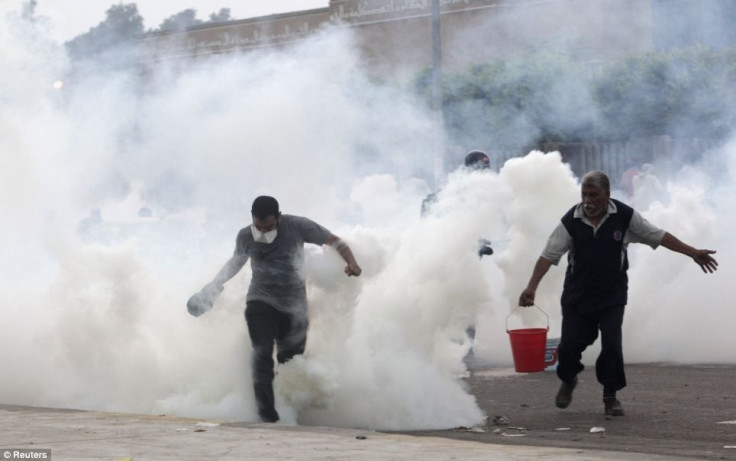Cairo Clashes Leave Dozens Of Morsi Supporters Dead; 'Huge Pools Of Blood' In The Streets

Dozens of protesters supporting ousted Egyptian President Mohammed Morsi were killed late Friday night and early Saturday morning in Cairo.
Muslim Brotherhood members have been staging a sit-in at the Rabaa al-Adawiya mosque in Cairo's Nasr City district for several weeks, calling on Egypt's military-backed government to restore Morsi to the presidency. Several defiant pro-Morsi marches were staged on Friday, following a massive demonstration in Tahrir Square supporting the new military government.
“We cannot accept this security chaos, and the road blocking, and the bridge blocking,” interim president Adly Mansour told the al-Hayat television station, according to the Washington Post. “We can’t accept the attacks on the public property. The state has to enforce its sovereignty.”
The police and Morsi supporters began clashing on Friday around 11:30 p.m., Cairo time, according to the New York Times. Security forces, reportedly assisted by armed anti-Morsi civilians, attacked the sit-in at approximately 3 a.m. on Saturday, according to the Washington Post.
Seventy people died in the clash, according to the Muslim Brotherhood. At least 29 dead protesters were laid out at a nearby morgue, with 20 more dead in a hospital close by, according to the Times.
BBC reporter Quentin Somerville, reporting from behind a barricade made of paving stones on the pro-Morsi side, described seeing protesters horribly wounded by live gunfire. There were also “huge pools of blood” in the streets, Somerville said.
“They are not shooting to wound, they are shooting to kill,” Brotherhood spokesman Gehad el-Haddad said, according to the Times.
Morsi, who swept into power after elections in June 2012 but was removed from office this past July, marking Egypt’s second revolution in two years. Many Egyptians were dissatisfied with Morsi’s rule, which was punctuated by a November declaration that, until a new constitution was ratified, all his actions as president would effectively be immune from legal challenge. The sweeping decree, supposedly aimed at avoiding legal stalemates in drawing up a new constitution, also gave him broad new powers to “protect” the revolution.
When the decree was announced, scholar Mohamed ElBaradei -- now acting vice president of Egypt -- said on Twitter that Morsi had “usurped all state powers [and] appointed himself Egypt’s new pharaoh.”
After the military removed Morsi from power, the electricity and gas shortages that had plagued Egypt rapidly abated, leading some supporters of the ex-president to suspect a conspiracy. The so-called “deep state,” the country's entrenched bureaucracy and business leaders, is thought to have balked at the prospect of an Islamist government, according to the New York Times.
Morsi has been held by the military since his ouster in an undisclosed location, without access to family members or his attorneys. He is also being investigated by the new regime for allegedly conspiring with Hamas, the militant Palestinian Islamist organization, in a prison break. The charges likely relate to his own escape, with dozens of other Muslim Brotherhood members, from the Wadi Natroun prison in 2011. Prosecutors say that Hamas gunmen killed 14 guards in that prison break, while the Brotherhood claims that locals attacked the prison to free their relatives.
“The charges are nothing more than an attempt by the coup leaders to discourage the public from supporting the president’s legitimacy,” former Egyptian culture minister Alaa Abdel-Aziz, now ousted along with Morsi, told the Washington Post.
© Copyright IBTimes 2024. All rights reserved.





















